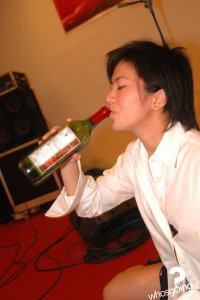Saddled with the name Alice, I've long-suffered from the inevitable Wonderland reference. However, when it comes to the critical acclaim for New World-style winemaking, I really do wonder if I've stepped through the looking glass.
I shun popular fruit-driven wines just as I do cardboard tomatoes. Others rush to them the way mice rush to sugar. Are we really tasting the same wines? Is my palate so peculiar? Or have others had their taste buds brainwashed?
It occurs to me that larger forces might be at play, pushing these bold flavors, especially when a respected winemaker gets publicly paddled for making wine in a restrained style. And especially when it's a vintner whose wines were previously lauded, like Steve Edmunds of Berkeley's Edmunds St. John winery.
I first experienced Edmunds' wine in the form of his Port O'Call New World Red. This was back at a 1989 wedding in the Berkeley hills, and it was everything I used to like about what California could produce. The grapes in the wine were identifiable as a Rhone-style blend with the taste of those lovely soft, barely cooked mi-cuit prunes from Provence, and didn't skimp on tannic structure, but it also had that California brightness.
Uber critic Robert M. Parker Jr. liked it as well. In his early criticism, he heaped on praise, calling Edmunds St. John perhaps the "finest practitioner" of Californians working with Rhone grapes. He remained an Edmunds supporter for nearly two decades, even stating in a 1994 write-up, "I love this guy's wines." But something started to turn. Parker's current notes might say more about where the critic is now, than Edmunds.
A couple of years back I traveled from New York to Paso Robles, on assignment researching the region's wines and attending Hospice du Rhone, an annual celebration of Rhone grapes. I'm a redhead who melts in the heat, and the sauna-like conditions on the day of the gala tasting - reminiscent of the real Rhone Valley - made me weak. I gulped some ice water and revived the old curmudgeon within as I grumbled, "OK, there must be something I can tolerate in this room."
A few wineries impressed me - Pipestone, Adelaida and Tablas Creek. But California generally is out of my usual taste preference. Still, I was there to experience the scenery, so I sidestepped the exhibiting French vignerons and made rounds of the locals. Right next to where the hefty wines of Turley Wine Cellars were being poured was their polar opposite: Edmunds St. John. With graying blond hair and vintage pre-'90s spectacles, Steve Edmunds, a boyish 58, had a get-me-out-of-here-and-put-a-guitar-in-my-hand kind of demeanor.
I took a sip of his Los Robles Red Viejos Rozet Vineyards Paso Robles from the 2000 vintage. I liked it and was so relieved to find Edmunds' mark of restraint still stamped on the wine. The 2001 Basseti Vineyard Syrah was next, all sunny and tasting of olive, with well-knit tannin. Good and healthy tannin. "There's hope," I thought.
But not everyone shares my love of tannin, like the guy tasting next to me. He asked Edmunds: "Is this ever going to open up?"
Like Edmunds' way of dressing, or his eyeglasses, little has changed in his winemaking. He still doesn't have his own winery. He buys his fruit from trusted sources. He approaches the wines as he has for more than 20 years. The dirt the grapes grew in did not change; neither did Edmunds' approach to the grapes. He still interprets the parcels he uses, with vintage and maturity being the only variables. He picks earlier than most and has never bowed to the gods of new oak. His aim is to work with the power of California fruit and not, as is popular today, augment it. The wine was plenty open for me. I directed Mr. Closed Wine to Turley.
Parker on the attack
Though Edmunds enjoyed Parker's praise, his scores never made it to the cult status of 95 points or higher. Since his first vintage in 1987, Edmunds' restrained style has made him an unsung hero for those who believe California should lower the sugar and lift the personality in its wines. But in Parker's eyes, Edmunds seemingly started to falter in 2004 and cracked in the 2005 vintage, when Parker slammed him with damning scores ranging from 84 to 87. Where in years past, even middling scores for Edmunds were accompanied by glowing prose, this time the words stung.
In the August 2007 Wine Advocate Parker wrote, "What Steve is doing appears to be a deliberate attempt to make French-styled wines. Of course California is not France and therein may suggest the problem. If you want to make French wine, do it in France."
"Wow," I thought, "wine critic on the attack." Criticizing a wine for trying to be French? As Edmunds has said, he does not want to augment the power that is natural to California. Was he punished for elegance or has America and its most favored critic forgotten the beauty of restraint? The personal attack seemed out of line, more like a spurned lover. There were also some choice words that would quickly lay me flat on a shrink's couch if they were used about a piece of my writing: "innocuous effort," "one-dimensional," "superfluous."
Was Parker was playing the Wonderland Duchess, screaming, "Off with his head"? Parker's style has been quick to laud and hesitant to criticize. This show of displeasure was highly out of character. The words indicated offense, but what could be offensive? Did Edmunds disappoint by not succumbing to a preference for jam and oak? Was this to be a cautionary tale to those who take a stand against non-Parkerized wines?
I wanted to inquire what Edmunds' thought of it all. Before we met up for dinner this March, I retasted some 2005s. I found the 2005 Parmelee Hills compelling, with touches of mint, the deep smoked blueberry of Syrah and a definite touch of granite in the rain. The wine had opened more than the last time I had it and was far from superfluous or innocuous.
In fact, over the next few days it opened up and showed even more complexity. The Red Neck 101 Eaglepoint Ranch, which Parker said had a "superficial personality," sang with cocoa, forest and plum. Both of these wines were quite closed when I last tasted them five months previous. Edmunds' wines need some time. Sometimes a few months. Parker is an experienced taster, shouldn't he have known this? (I would have contacted Parker, but I suspected he wouldn't take the call.)
I kicked off the Edmunds evening with a brilliant skid on the slick floor of New York's Gramercy Tavern restaurant that landed me right on my butt. As I nursed my wounds over a bottle of Beaujolais, Edmunds told me he, too, was mystified by the Parker debacle. It occurred to him that somehow he offended the critic. Perhaps it was a discussion of Syrah on Parker's Web site. "I said that I hoped that Syrah didn't get turned into an SUV, and Parker popped in on the thread and called me a wimp."
Vintner sticks to his guns
But there is evidence of discontent in the wings. Despite Edmunds' spanking, I'm hopeful that others might have the spunk to lower the dial on the fruit and expose the complexity California wine can have.
"Plenty of people offered me encouragement," Edmunds said, "for being willing to take such a beating for not making the style of wine that Parker seems to demand."
What helped ease the pain was that far from worrying about hurting his sales, Edmunds' East Coast sales rep sent out a mailing that said: "Edmunds St. John scores mediocre points in the Wine Advocate!"
And the wine sold like hotcakes.
Maybe I'm not in Wonderland after all.
Alice Feiring
skip to main |
skip to sidebar
Enhance the pleasure that you get from wine by sharing your experiences, knowledge, news articles and facts about the elixir of the gods and bacchanalia on earth by emailing: bacchusforyou@bellsouth.net
How Much Did The Best Bottle of Wine You Ever Drank Cost?
CONTACT INFORMATION
TO SUBMIT A POST, TO BE PUT ON THE MAILING LIST, TO HAVE QUESTIONS ANSWERED, ETC.
EMAIL:



